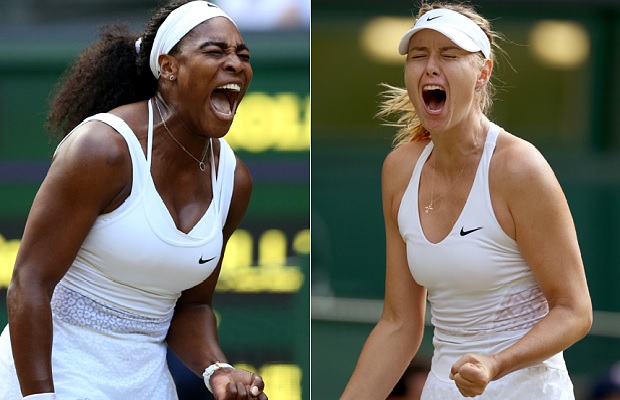Tennis
Maria Sharapova and Serena Williams put 15-year feud on line at US Open — See Huge Announcement…

If Serena Williams really did say of Maria Sharapova in the Wimbledon locker room in tearful defeat 15 years ago, “I will never lose to that little bitch again”, she was wrong but she set in train the most impassioned and complex rivalry in tennis.
When it reaches its latest and probably final peak – in the first round of the US Open on Monday night – the 22nd match scheduled between the emotional American and the ice-cold Russian might lack the fire and quality of the past but it will be none the less enthralling for that.
The match between the former champions, each of them fighting late-career ennui, is a gift of a quirky draw. Even a few years ago it would have been a final, however predictable the result. Now it is a history lesson. Sharapova turned 32 in April. Williams is 38 next month. It is the sporting feud that, statistically, is anomalous. In the heart and soul, however, there has been none like it.
Williams did lose to Sharapova on court again, of course. Once – in their next match, blowing a one-set lead in a Tour match in Los Angeles. But she has beaten her in their 19 other completed matches – and then withdrew injured when they were due to meet in the fourth round of the French Open last year. Victories do not come more pyrrhic.
The little bitch of 2004 had flowered into a long, lean queen of the court, owner of five majors, one of the sport’s most formidable fighters – the greatest of them all, according to John McEnroe. But she surely must have been relieved that Williams’s shoulder injury robbed the American of the chance to add to her rolling humiliation that day at Roland Garros.
If Williams – who has had health and injury issues in her trophyless run since giving birth for the first time two Septembers ago and has played a fitful schedule – were to withdraw this time, it would suck the air from the draw, the season and the game. Fingers crossed.
Because this is more than a tennis match. It is an event. If it were held in Madison Square Garden 10 miles away with gloves on, it could not be more loaded with the prospect of a knockout. As Roger Federer remarked recently, there are no draws in tennis.
The nervous energy and sense of expectation gathering around it should light a flame under the championships on day one – not dissimilar to that which Sharapova delivered on her comeback from her 15-month drugs exile when, in a sparkling outfit that would not have looked out of place on a Manhattan catwalk, she beat the then world No1, Simona Halep, in the first round here in 2017.
Sharapova, uncertain if she could rediscover her grinding magic, went on to win twice more, from a set down against Timea Babos and nervously in straights over the American teenage wildcard Sofia Kenin, before the 16th seed, Anastasiya Sevastova, stopped her progress. Unseeded but adored by sponsors and television, she had performed only on the main court, under lights. But that redoubtable run will fade in the memory if she manages to beat her magnificent tormentor. Whatever their public show of civility – and there is mutual professional respect, at least – those locker-room sentiments after their first meeting are barely diluted.
The last time they exchanged forehands was in Melbourne, when Williams inflicted a ritual beating in the quarter-finals. Sharapova failed her drugs test then and soon would disappear from the Tour.
In her 2017 autobiography, Unstoppable: My Life So Far, Sharapova revealed much.
“Serena and I should be friends; we have the same passion,” she said. “But we are not. I think, to some extent, we have driven each other. Maybe that’s what it takes. Only when you have that intense antagonism can you find the strength to finish her off. Who knows? Some day, when all this is in our past, maybe we’ll become friends.”
Perhaps. It would be nice. But, as Sharapova revealed in her book, there is another reason for the chill between them. After she beat Williams at Wimbledon Sharapova followed her into the locker room.
“What I heard when I came in to the locker room was Serena Williams bawling,” she wrote. “Guttural sobs. I got out as quickly as I could, but she knew I was there.”
The enmity was set in stone – and not just because a skinny Russian teenager had come from nowhere to beat a great champion, as Sharapova revealed.
“Mostly I think she hated me for hearing her cry,” she recalled. “Not long after the tournament, I heard Serena told a friend – who then told me – ‘I will never lose to that little b**** again.’”
And here we are, one more time. Williams, who needs another major title to match Margaret Court’s record of 24 majors, will dread losing to Sharapova, whom she beats for fun. That cloying fear of failure will probably be enough to get her the win but now the assuredness is missing, from her game and her tennis.
This year, Williams, ranked No 8 in the world, has played 29 matches and won 22 of them, suffering most recently in the Wimbledon final. Sharapova’s 2019 record is considerably thinner: she is 87 in the world, with an 8-7 log.
For once, form is irrelevant. Don’t blink.




















